Durian. That big, hulking thorny beast, with an aroma so strong it’ll knock your grandma to her feet. Native to Malaysia and Indonesia, it’s a divisive figure in the world of food. Banned on Singapore subways for its smell (potent even when the husk is intact), it’s the Kanye West of fruits: you either hate it, or you love it. Intensely.
Happily for me, I belong to the second camp as I stare down an entire box of the things. I’m one of 15 contests taking part in a durian eating contest at the Malaysia festival in Sydney’s Tumbalong Park. But it wasn’t always this way.
As a child I found the smell of durian absolutely repulsive. Which is unfortunate when your parents are Malaysian, a country of durian-obsessives. The funny thing about being a convert is that I can no long remember how I ever found it disgusting. But there have been plenty of food writers who never managed to cross over, and have memorably written about the fruit:
It tastes like completely rotten mushy onions – Andrew Zimmern, host of Bizarre Foods
Like eating raspberry blancmange in the lavatory – Anthony Burgess, author
Its odour is best described as pig shit, turpentine and onions garnished with a dirty gym sock – Richard Sterling, food writer
Your breath will smell as if you’ve been french kissing your dead grandmother – Anthony Bourdain, chef and TV host
Bourdain, it should be noted, is actually a fan, although his other durian description – “like pungent, runny French cheese” – may not have you running to the nearest supermarket. You’d be lucky to find one, in any case. Though currently out of season, I managed to pick up a four kilo monster in Chinatown for $20. Shopping for durian is hit and miss in Australia – there are too many subpar defrosted specimens floating about.
In South East Asia, durian is described as the “king of fruit”, in part due to its aggressive appearance. If you manage to hack your way through the prickled, armour-like skin, the inside reveals around 10 seeds the size of dates, each covered with a thick, custardy, off-white “meat” – the only edible part of the fruit.
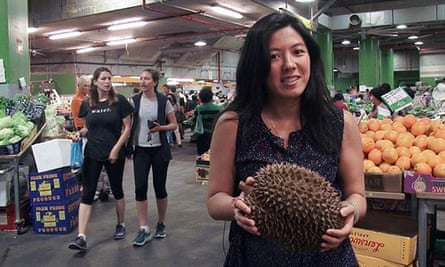
To durian lovers, the taste is mildly sweet, almondy and very creamy, not unlike a rich cheesecake. It has a whiff of alcohol about it, which explains why eating it gives you this hot feeling inside – like you’ve downed a shot of vodka. In fact the Chinese believe you shouldn’t eat too much of it, or you’ll develop “internal heat” – and you should definitely not eat durian with alcohol.
Of course, eating too much – and too quickly – is exactly what I was about to do. But considering my previous distaste for the fruit, it’s kind of remarkable I was taking part in a durian eating competition at all. My own personal journey from hater to advocate came at a time in my life, during my early 20s, in which I began to take a strong interest in Asia, and my own Asian heritage. Coincidence? Probably not.
Eating durian in Australia never feels completely right – it inevitably becomes an exercise in nostalgia for another place. For me, it harks back to memories of being with my cousins in the muggy heat of Malaysia, and stopping by a hawker stall to fill up the car boot with fresh durians. Then taking them home and watching my cousin lay out sheets of newspaper on the tiled floor, and expertly cleave her way through the skin. We would feast on the gooey flesh until the entire family was virtually comatose with fullness.
The humid, noisy, bustling and yes – stinky – streets of South East Asia are wrapped up in the love-it-or-leave it nature of the durian. You will either be overcome, seduced by its powerful, declarative presence, or reject it outright. And run screaming.
Did I win the competition? No, I didn’t. I didn’t even manage the top six, thereby missing out on a Malaysian food hamper. But standing there with my 15 fellow competitive eaters, cheeks bulging and lips dripping with yellow, durian intestine, it was pretty clear to all of us: there are no losers in a competition that requires you to eat delicious, delicious durian.
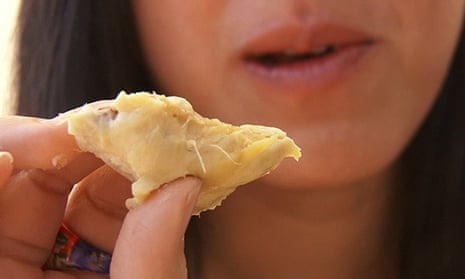
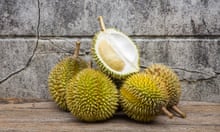
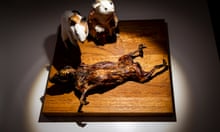


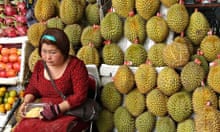


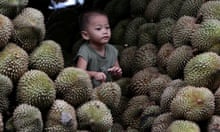
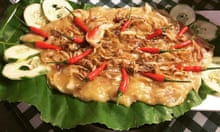
Comments (…)
Sign in or create your Guardian account to join the discussion